Joint Press Release: ENDING FGM/C BY 2030: Uniting forces to make FGM/C a practice of the past

Download Press Release as PDF JOINT PRESS RELEASE: ENDING FGM/C BY 2030: Uniting forces to make FGM/C a practice of the past 2nd June 2019, Vancouver (Canada) 3.9 million girls are at risk of female genital mutilation/cutting (FGM/C) every year. On the 2nd June 2019, for the first time ever, NGOs, grassroots and survivor-led organizations from around the world came together at the Women Deliver conference around a common goal: to end FGM/C by 2030 and to support survivors of the practice. This is our Call to Action. FGM/C is happening on every continent except Antarctica: it is a global issue that needs a global response, which is why we have come together – across Asia, Africa, Europe and North America – to build a unified platform for action. Together, we represent no less than 38 countries from all regions of the world. The time has come to make FGM/C a global priority, in the same way the community responded to urgent global epidemics, such as HIV/AIDs. FGM/C is a violation of the human rights of women and girls and must be ended in all its forms. Whole communities must be mobilised and empowered at the grassroots level if we are to end FGM/C – women and girls, men and boys, traditional and religious leaders, health workers, law and policy makers. During the opening plenary of the Women Deliver conference, His Excellency Uhuru Kenyatta, President of Kenya, committed to end FGM/C in Kenya by 2022. We welcome this and call on all global leaders at the conference, and beyond, to commit to end FGM/C. To put an end to the harmful practice of FGM/C, we will work in partnership with each other, all communities, governments, donors, multilateral bodies and others to end the practice by 2030 in line with the Sustainable Development Goals (SDGs) determined by the UN. Together, we will challenge the social and gender norms by addressing the root causes of gender inequality at the community level, including gender stereotypes, unequal power relations, and negative social norms. Because this is what holds the continuation of FGM/C in place: control of the female body, of women’s sexuality and of their freedom to decide for themselves. We must also acknowledge our current failure in providing adequate support systems for FGM/C survivors. We need to provide security and protection, targeted research and resources to enable health and emotional wellbeing as well as post-trauma support. We also need to better understand and respond effectively to adaptations to the practice which continue to violate women’s rights, such as medicalization, cross-border practices, and lowering the age at which FGM/C is carried out. Investment is needed in increased and better research into what is working, and what is not working, to end FGM/C. Funds should be more flexible, sustainable and accessible for communities. We need an integrated, intersectional approach to ending FGM/C, recognising the connections with other forms of gender-based violence and linking with existing movements. We are focused on coming together and working collaboratively to address what existing gaps there are, making sure that FGM/C is a practice of the past. Signatories: Amref Health Africa COVAW End FGM Canada Network End FGM European Network Equality Now Orchid Project Sahiyo The Girl Generation There Is No Limit Foundation The Inter-African Committee on Traditional Practices Tostan US End FGM/C Network What is FGM/C? It is estimated that 3.9 million girls and women underwent the practice of female genital mutilation/cutting (FGM/C) in 2015 alone (source: UNFPA). FGM/C comprises all procedures that involve partial or total removal of the external female genitalia, or other injury to the female genital organs for non-medical reasons. FGM/C is recognized internationally as a violation of the human rights of girls and women. It reflects deep-rooted inequality between the sexes and constitutes an extreme form of discrimination against women. It is nearly always carried out on minors and is a violation of the rights of children. The practice also violates a person’s rights to health, security and physical integrity, the right to be free from torture and cruelty, inhuman or degrading treatment, and the right to life when the procedure results in death. Further Women Deliver blog posts: Multiple events on FGC hosted at Women Deliver in Vancouver Global Call to Action From “Uniting forces to make female genital mutilation/cutting a practice of the past: A gathering for global civil society actors”
Sahiyo Stories screened at Academy of Communications in Healthcare Workshop

By Renee Bergstrom, EdD On January 30, 2019, I presented the workshop: Patient Engagement through Brief Focused Videos featuring the Sahiyo Stories at the Academy of Communication in Healthcare (ACH) Winter Course in Scottsdale, Arizona. ACH endeavors to promote empathy and better communication among health care providers, patients and families. I prepared throughout my adult life to someday share my story to advocate to end female genital mutilation/cutting (FGM/C). This groundwork included learning through formal education, plus strengthening the emotional, social and spiritual foundation of my being. The purpose in showing the Sahiyo videos was two-fold: to promote deeper understanding of female genital mutilation’s impact on survivors, and to discuss the storytelling process and the feasibility of ACH engaging patients’ trauma stories through focused videos. Three women attended the workshop I hosted, including the president of the organization who is a nurse midwife. After the workshop, their evaluations were positive. “I think this was a powerful video that was personal to Renee,” a participant said after watching my video. “It provided an example of what might be possible to create for patients through ACH. That would be an entire different brainstorm session. This video was so impactful that it was hard to move on in this session.” “Pre-work (writing story) was very helpful and heightened my receptivity/engagement.” I found it crucial to share Sahiyo’s work with the very caring doctors and nurses who are fellow faculty members and have placed the link to the Sahiyo stories on the ACH library page. Renee Bergstrom, EdD, is an educator who advocates for relationship-centered medical care. She and her husband, Gene, have been married 53 years. They have three children, ten grandchildren and one great-grandson. They live in a dynamic art town in midwest America where they are very involved in the community. Renee has been an advocate for women’s justice throughout her life.
Sahiyo’s New Video Campaign: No More Female Genital Cutting -Volunteers Share Their Stories
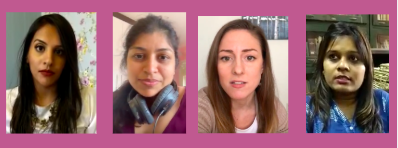
As April is known as Sexual Assault Awareness month, as well as a National Child Abuse Prevention Month and Female Genital Cutting (FGC) is an issue which lies at the pivotal intersections between these two issues, Sahiyo has begun a campaign to highlight why the Sahiyo community is working to both support survivors of FGC as well as to work towards preventing FGC form occurring to future generations of girls. Sahiyo reached out to our community of volunteers- spanning the globe, from Bahrain to Boston, and asked them to share their thoughts on their activism to end FGC, and why this issue matters to them. Throughout the month, short videos made by our Sahiyo community will be shared via social media. These voices belong to our volunteers, staff, advisory board and storytellers, each of whom has a different history and experience or knowledge of FGC – from beginning volunteers to more experienced advocates Do help us share this tapestry of powerful voices that are part of the ‘No More FGC- Volunteers Share Their Stories’ campaign by sharing these videos with your own networks. Find them on Sahiyo’s Youtube or Facebook today!
Experiencing Sahiyo’s Activist Retreat in Mumbai
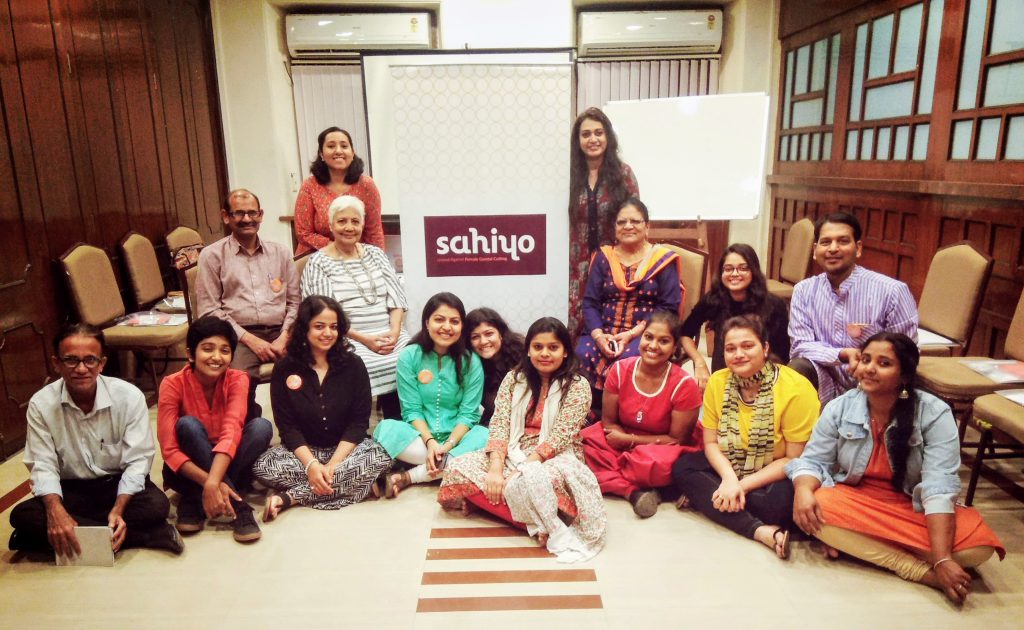
By Xenobia Country of Residence: India There are those who talk about change, and then there are those who do things and bring about the change. I would like to tell you about the time I decided to be a part of the Sahiyo’s Activist Retreat in Mumbai, and met such wonderful people who, in my eyes, were nothing short of superwomen. I cannot even begin to describe how amazing it is to meet like-minded people all driven by the same cause. It is honestly inexplicable. In today’s times, do you know what good, honest peer support feeling is like? Let me tell you: it was out of this world amazing! Did a couple of seemingly insignificant days change my life? Yes, they did. Prior to this event, was I feeling anxious and apprehensive about what it would turn out to be like? Oh, extremely. Was I nervous? Yes. Was I also curious about what would I take away from this retreat? Yes. Did I think it was going to be all about a bunch of women getting together to purely rebel against a cause? I will admit, yes. I knew about Sahiyo, and the cause that they are fighting for. I admired and respected them because I had been fighting for the same cause all my life, too, but silently. Many members of the Bohra community do not react well to independent thinkers, so it takes a lot of courage and true liberation to speak your mind on a public platform. Naturally, one ‘black sheep’ tends to have heard about the other. But immense respect for them aside, I was partly curious about what I would really learn here, and partly interested in what could be done to rightly channel the feelings I felt toward the people who endorse female genital mutilation (FGM). Needless to say, I couldn’t stop talking about this retreat when I returned home! There were some brilliant, fantastic people there from all walks of life, sharing their experiences, sharing their stories and how they heard of FGM, how it has impacted their lives, and what they are doing about it. Our co-hosts Insia and Aarefa were warm as ever, right from introductions and group bonding activities, to efficiently addressing counter arguments and introducing us to a world of relevant introspection, as opposed to traditional garish rebelling. There was also a talk given by a reputed gynaecologist, where we learned so many essential truths about the details of FGM that no one else talks about. So enlightening! It was as if there was a strange connection between all of us toward the end of the program. It’s not news that Bohras suffer from a major identity crisis anyway, considering most cultural aspects are borrowed from different parts of the world with no real roots anywhere. For someone who always found it hard to really fit in anywhere, it was as if I had found home at last. In spite of everyone at the retreat coming from such different backgrounds, locations and mindsets, it was really amazing. I, personally, have always felt very strongly about FGM/C and the concept of a random third person deciding what should be done with my body without my consent. But this experience and interaction has not only changed the way I see things, but has also made my resolve and conviction stronger – about fighting for every girl child out there, subjected to any such torture and abuse, until I have no life left in me, irrespective of how long it takes. For showing me how to efficiently channel all that I feel toward all forms of injustice done to women, and for this beautiful chapter of my life, I will be forever grateful to Sahiyo.
Moving Beyond Cultural Relativism to a Call for Action to End Female Genital Cutting
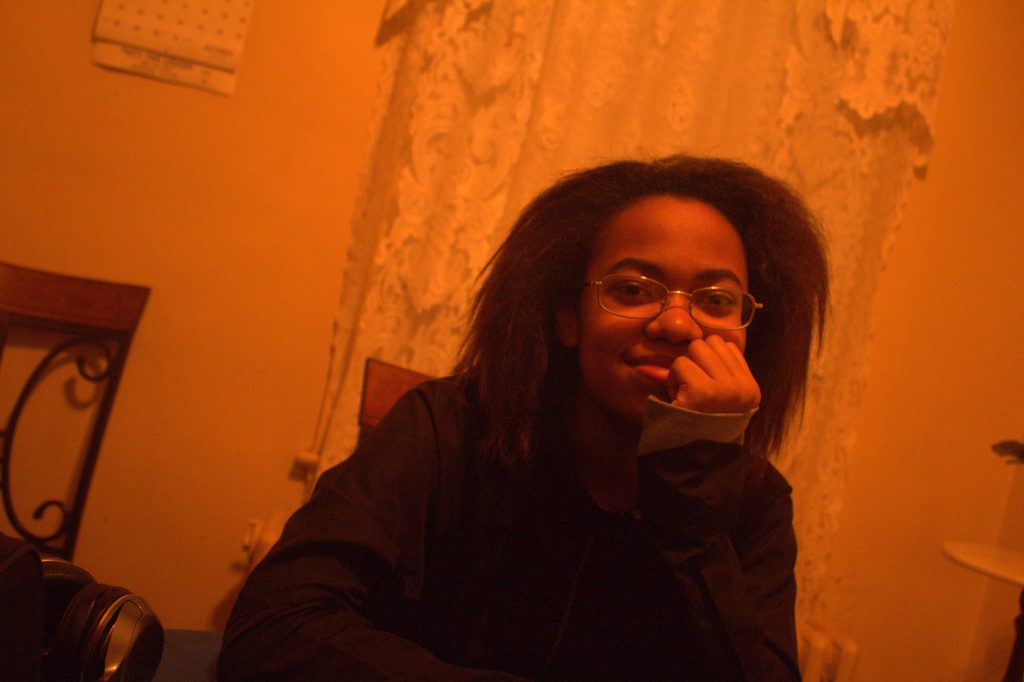
By Brionna Wiggins Earlier this year I had no idea about female genital cutting (FGC). None whatsoever. I mean, events happen all the time around the world and I’m not aware of the dozens of happenings that occur day-to-day. But for FGC to go on without so much as a whisper of this harmful practice, I thought was rather strange. I learned about FGC when I was given an assignment during my junior year in high school. It was a Pre-Senior Project, which was essentially a practice before our year-long project we had to do for our final year of high school. Ideally, we were to choose a topic that pertained to our passions or a problem related to us on some level. I was at a loss for what to choose. Everyone around me jotted down several potential ideas, but my ideas were comparatively vague. By day two or so, I sat with my teacher to make a final decision. My teacher wrenched out my distaste for injustice and helped me narrow the target of people who undergo it. She typed online in the search bar something along the lines of “issues involving women and children” and there it popped up–female genital cutting. I was appalled when I first learned about it. To reiterate, I had no idea this tradition existed and I wondered how it continued to go on. Why did women and men subject their daughters to this? What was the appeal? I dug deeper, finding out the reasons behind FGC. In some communities, while the intention was to keep daughters clean or marriageable, it was done at the cost of carrying out a potentially traumatic procedure that could leave the woman or girl with a handful of health issues afterward. However, the concept of cultural relativism impeded criticism and questioning, while justifying the tradition. The idea that because one has not lived in a certain community or society, they can’t truly pass judgment on the cultural practices of others. Two people living in two different places across the world from each other naturally grow up with different experiences. Who is to say that another’s culture and traditional practices are objectively wrong? What is considered wrong when it comes to culture? Outsiders may feel as if they do not have a voice in regard to scrutinizing FGC because it’s an issue beyond their homes. Therefore, proponents of FGC claim that the divide or differences between two groups is too great to judge each other. Admittedly, I initially agreed with the notion of cultural relativism. Who was I to criticize people who carry out FGC in their communities when I knew nothing of their lives? Even so, remaining in place and staying quiet, doesn’t sit well with me, especially if I could be a person who brings awareness to FGC being a human rights violation. The excuse of cultural relativism shouldn’t be used when people are being harmed. I continued researching FGC for my project the next school year, my senior year in high school. This time, the project had to be more extensive, including a longer research paper, another presentation, and some sort of final product. This ranges from documentaries to creating design plans. With all this work I was doing, I thought maybe I could make some sort of difference. I needed a mentor for guidance, one who is an expert on the topic. I sent out an email or two before finding Mariya, a co-founder of Sahiyo. The organization specializes in advocacy regarding FGC, even working with affected communities to diminish the practice. By sharing the stories of women involved with FGC, a wider audience becomes aware of the issue with a deeper understanding. With the combined efforts of multiple organizations and people from different walks of life, the perception of practicing communities will change. Then, I believe, FGC will become part of the past. Over the course of my project, I hope to improve my advocacy skills and fully understand the issue that I’ve been invested in for the past couple of months. So far, researching FGC and looking into multiple perspectives has encouraged me to consider my own views on the topic. By the end, I will have figured out my ethical priorities. For the rest of my blog posts, I want to look into a handful of countries where FGC is practiced and talk about the circumstances around them. Until next time! More on Brionna: Brionna is currently a high school senior in the District of Columbia. She likes drawing, helping others, and being able to contribute to great causes.
A Tradition That Branded Me
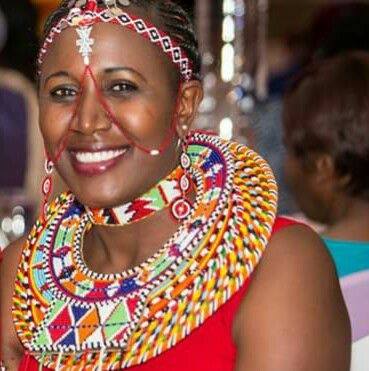
Sahiyo Volunteer nominated for The Global Woman Student Ambassador Award
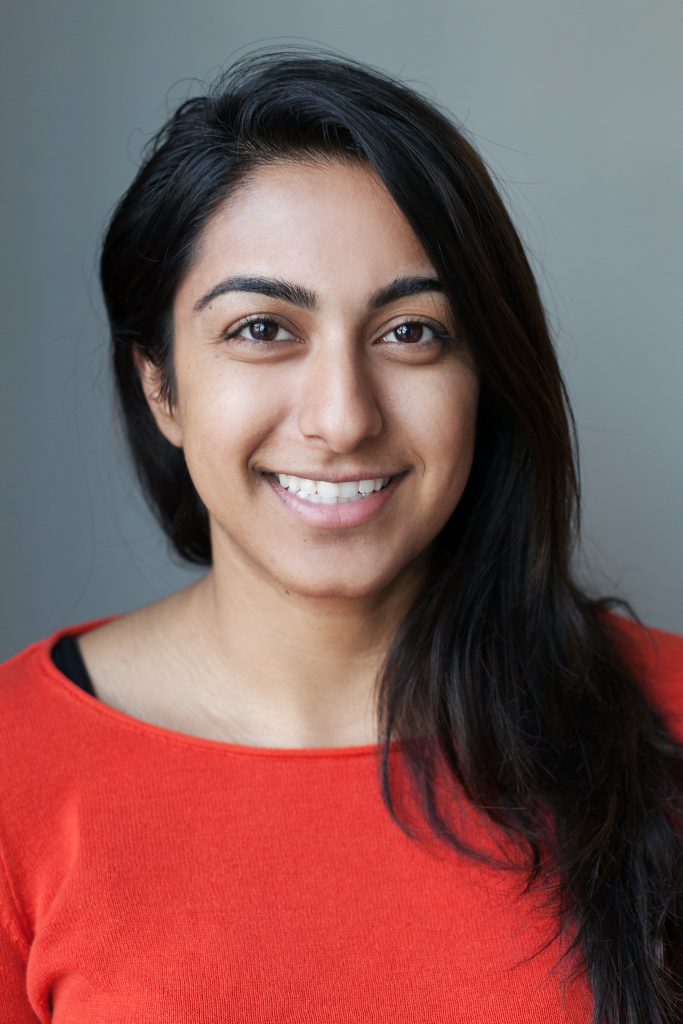
Sahiyo’s Maria Akhter has been nominated to receive the Global Woman Award in the “Student Ambassador” category, on Friday, October 26, 2018, in Washington, D.C. The awards are given by the Global Woman P.E.A.C.E. Foundation to people who do a great deal to protect girls and women from various types of violence, including FGC. The Global Woman P.E.A.C.E. Foundation is a 501c3 non-profit organization, located in the Washington, D.C. with the mission to empower women and girls through education to help eradicate gender-based violence, with a primary focus on the campaign against female genital mutilation (FGM). In October 2015 the organization launched the Global Woman Awards, to recognize the exceptional work of individuals in the advocacy of the empowerment of women and girls. Click here to learn more about the Global Woman Awards and the annual 5K Walk Against FGM organized by the Global Woman P.E.A.C.E. Foundation.
Sahiyo participates in Canadian webinar on FGC

On May 23, the Canadian Partnership for Women and Children’s Health (CanWaCH) hosted a unique webinar to help Canadian social sector organisations get acquainted with the practice of Female Genital Cutting. As an organisation working to end the practice in India and other Asian countries, Sahiyo was invited to present some of its work during the webinar. CanWaCH is an Ottawa-based umbrella organisation with a focus on women’s health and gender equity. Its members come from across civil society, research and health sectors. The webinar on May 23 was for CanWaCH’s member organisations as well as the wider public, and it aimed to stimulate greater participation from Canadian NGOs, charities and institutions in the global movement to end FGC. Through presentations by various global organisations already working in the field of ending FGC, the webinar focused on sharing knowledge and best practices with the audience. Participants included Anne-Marie Kamanye and Peter Nguura from Amref, a CanWaCH member organisation that has anti-FGC programmes in Kenya, Tanzania and Uganda; Jenna Richards from Orchid Project, a UK-based organisation that supports anti-FGC partners in Senegal, Kenya and India, among others; Aarefa Johari from Sahiyo; and Alissa Koski from McGill University in Canada. Sahiyo shared information about the key elements required in an individual or organisation’s efforts to end FGC. Koski discussed the methods and challenges of conducting monitoring and evaluation of anti-FGC programmes.
Asking more questions is the key to change, and to ending Female Genital Cutting

By Priya Ahluwalia Priya is a 22-year-old clinical psychology student at Tata Institute of Social Sciences – Mumbai. She is passionate about mental health, photography and writing. She is currently conducting a research on the individual experience of Khatna and its effects. Read her other articles in this series – Khatna Research in Mumbai Flexibility is a key characteristic of successful research, and it is an extremely essential component of the questions on which the research is based. Although I believe that having an exhaustive list of questions pre-prepared is essential to keep one on track, however as one reads and interacts with others, newer lines of enquiry are generated. It is crucial that all lines of enquiry be amalgamated to allow for a wholesome insight into one individual’s experience. Currently my interactions with women allowed me to see connections in their narratives. Accompanied by the literature I read, I found similarities as well as differences in the narratives of women across the world. Researchers have found that Female Genital Cutting (Khatna) leads to urinary problems, menstrual problems, problems in sexual functioning and difficulties during childbirth; some have even found that the psychological distress of the trauma often leads to depression and anxiety among women. A common pattern I found among studies was that all mental distress experienced by women was studied as a didactic relationship, ie, the women in relation to another individual. For example, sexual difficulties leading to marital distress among husband and wife. However it was intriguing that in my interactions with women I found that Khatna has a great impact on the women’s relationship with themselves. For example, a participant reported that she dealt with self-esteem issues because she felt out of place while growing up, as she did not have the same sexual impulses towards boys as her other friends, the lack of which she attributed to Khatna. My area of interest was always the psycho-social effect of Khatna. However, now I am more curious than ever to explore how Khatna impacts both women’s social relationships as well as their relationship with themselves. Little research has been done to explore how an individual’s worldview (ie, understanding of the world and how it functions) shifts after their discovery and understanding of Khatna. My curiosity in this area was ignited when one woman reported that following her discovery of Khatna, she was extremely angry with her family and although she has now made peace with her family, her trust in them and her faith in people’s ability to make good decisions has been shattered. I am now fascinated to interview more women and see how their worldview might have shifted after their discovery of Khatna. Furthermore, research in attitude formation shows that negative experiences with one aspect of a larger domain leads to a negative attitude towards all aspects of the domain. If the same was extended to the practice of Khatna rooted in religious obligation, it would be interesting to explore how attitudes towards Khatna and religion are interlinked. With each conversation, the questions in my mind multiply and it is often followed by a sense of hesitation of being overambitious. However, I do not let the hesitation pull me back, and the credit for that goes to one research participant who told me that if someone before us had asked these questions, then we wouldn’t have to be here today, and unless we ask these questions, nothing will change and we will still be here five years down the line. I have made a decision to change, have you? To participate in Priya’s research, contact her on priya.tiss.2018@gmail.com
Amnesty India features Sahiyo and WeSpeakOut in its ‘Brave’ campaign
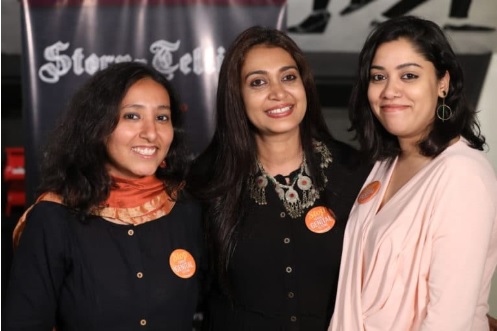
Leading human rights organisation Amnesty India has featured Sahiyo and WeSpeakOut — the two collectives working to end Female Genital Cutting in India — in its new campaign titled “Brave”. The campaign aims to highlight the work of individuals and groups working to defend human rights, truth, and justice in India, despite facing threats, attacks and other kinds of backlash. Other brave individuals featured in the campaign are: Chandrashekhar Azad, who founded the Bhim Army to fight for Dalit rights in Uttar Pradesh; Sagolsem Menor Singh, who campaigns for justice for the families of those killed in fake encounters in Manipur; and Gauri Lankesh, the journalist and human rights activist who was shot dead for her views last year. Sahiyo and WeSpeakOut have been recognised for raising their voices against a taboo topic: the ritual of cutting young girls’ genitals in the name of culture and religion. During the course of the year, the Amnesty campaign will help support and amplify Sahiyo’s work.
